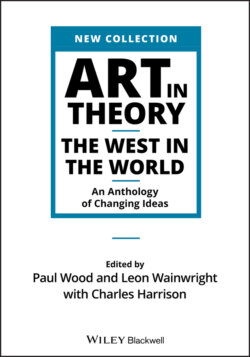Читать книгу Art in Theory - Группа авторов - Страница 55
IB10 Juan Rodríguez Freile (1566–c.1640) On the legend of El Dorado
ОглавлениеJuan Rodríguez Freile (or Freyle) was born in South America of Spanish parents (thus a ‘creole’, in Spanish race terminology). As a young man he travelled to Spain but returned to the New World in the late sixteenth century. He thereafter lived and worked on his estate and in old age turned to writing an account of his country’s development. In the early part of the work he discusses pre‐conquest native customs. One of his sources for this was a friend, named in the book as ‘Don Juan’, who was himself the nephew of the last native ruler of the area before the coming of the Spanish. The story of a golden king had been mentioned earlier by both the Spanish historian Fernández de Oviedo and Sir Walter Raleigh, but Freile gives the fullest account of the ritual of the Muisca people at Lake Guatavita (in present‐day Colombia). Freile’s manuscript, written c.1636, is lost, but it was copied in the eighteenth century and printed in the nineteenth. Our extract is taken from Juan Rodríguez Freile, The Conquest of New Granada, translated into English by William C. Atkinson, London: The Folio Society, 1961, pp. 35–6.
Don Juan recounted to me how, when the Spaniards came by way of Vélez to discover and conquer the kingdom, he was fasting in preparation for the succession; for with this people the inheritance passed, as it still passes today, to a sister’s son. He had already had knowledge of women at the time he began his fast. The way of the fasting, and of the other ceremonies, was as follows.
Tradition required that, when a nephew was to succeed his uncle, he should observe a six‐year abstinence. This he did in a cave set aside for the purpose, and during this time he was to have no commerce with women nor eat flesh, salt or chili. Nor might he ever see the sun. Only at night could he leave his cave and behold the light of the moon and stars, withdrawing again before the sun’s rays should fall on him. Once all this had been performed he was invested as prince, and the first obligation then laid on him was to go to the great lake of Guatavita and make offerings and sacrifices to the devil, his god and master.
In this too there was due ceremonial. On the lake lay a huge raft made of reeds, furnished and adorned as attractively as might be. Here were placed four lighted braziers in which burned quantities of resin, their form of incense, and turpentine, with other divers perfumes. All round the lake meantime – this being a considerable expanse of water, deep enough to take sea‐going vessels – there had assembled countless natives of both sexes decked out with feathers, strips of metal, gold chaplets, with a great number of fires laid all about. As soon as the burning of incense began on the raft they set light to these, till the smoke blotted out the light of day.
At this point the heir was stripped to the skin, anointed with clay and powdered with gold‐dust, until he shone gilt all over. They then took him aboard the raft, and at his feet placed a great heap of gold and emeralds that he might make offering to his god. Four of the leading caciques also adorned with plumage, gold headbands, armlets, metal strips and great gold ear‐rings then joined him. They too went naked, each bearing his gift.
The raft was propelled away from the shore to the blare of trumpets, horns and other instruments, and at this there arose a mighty shouting from the crowd which thundered over hill and valley and lasted until the raft had reached the middle of the lake. From there the fluttering of a banner commanded silence. The gilded Indian made his offerings, throwing into the water the pile of gold at his feet. The other caciques in attendance did likewise. The banner, which had been held aloft meantime, was now lowered, and the raft moved back to the shore to the accompaniment of renewed shouting and the sound of pipes and trumpets, while the people formed large circles and began dancing after their fashion. In this manner was the heir received and acknowledged as their lord and prince.
It is from this ceremony that there derived the famous legend of El Dorado, that has cost so many lives and fortunes. The ‘man of gold’ was first heard spoken of in Peru, where Sebastián de Benalcázar fell in with an Indian from these parts, who told how in his country, when they wanted to proclaim a new king, they took him to a great lake and there gilded him all over. Benalcázar’s remark, ‘Let’s go and find this Indian covered with gold,’ gave rise to the term, which, with the story, was carried to Castile and all over the Indies.
